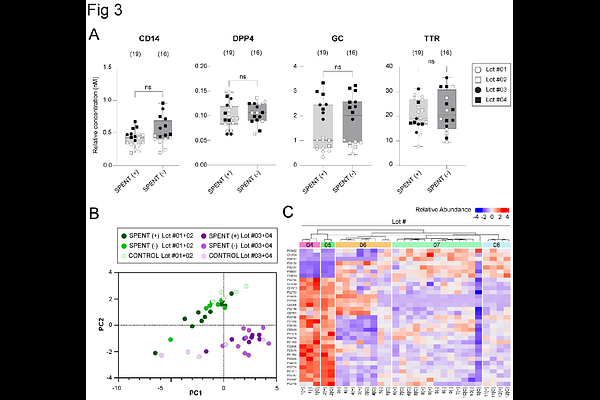Human Serum Albumin as a Hidden Source of Variability in IVF Culture Media

Human Serum Albumin as a Hidden Source of Variability in IVF Culture Media
Nezvedova, M.; Porokh, V.; Bockova, T.; Pustka, V.; Kyjovska, D.; Maierova, B.; Kloudova, S.; Otevrel, P.; Holubcova, Z.
AbstractSoluble proteins present in spent culture media (SCM) have been proposed as potential indicators of embryo viability. However, results across studies remain inconsistent, and the identity of reliable protein biomarkers is still unclear. To evaluate the potential of secretome profiling for non-invasive embryo assessment, we applied state-of-the-art mass spectrometry to analyze the protein composition of SCM from individual successful and unsuccessful human embryo cultures, alongside corresponding controls cultured under identical conditions. Surprisingly, both untargeted (nanoLC-TIMS-TOF-MS/MS) and targeted (UHPLC-QqQ-MS/MS) proteomic analyses consistently detected multiple human proteins in unconditioned media, indicating that these signals are not of embryonic origin. Undeclared proteins were also identified in media sampled before their first use, with considerable variability observed across production batches. Supplementation experiments demonstrated that this variability originates from the addition of plasma-derived human serum albumin, which introduces a range of contaminating proteins. In contrast, recombinant albumin did not contribute detectable serum proteins. These findings indicate that the protein background in commercial IVF media is an overlooked variable, not only compromising the reproducibility and interpretation of secretome analyses in research, but also contributing to unstandardized culture conditions in clinical IVF practice. While this study evaluated 13 production lots of monophasic media from two different manufacturers, the results underscore a broader need for transparency and standardization in IVF media composition. The adoption of fully chemically defined IVF media, free from purified serum components, would support more consistent embryo culture conditions and advance the discovery of biomarkers in SCM.